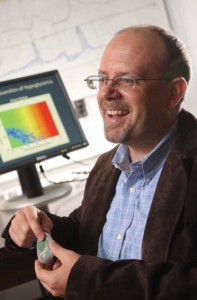 Clemson IE is pleased to announce that Stephen Patek, PhD is the featured presenter on Friday, March 13th from 2:15pm – 3:05pm in Freeman 140. Dr. Patek, from the University of Virginia, is the fourth guest presenter in the Spring 2015 – IE Seminar Series. His seminar is entitled “Behavioral Aspects of the Artificial Pancreas.”
Clemson IE is pleased to announce that Stephen Patek, PhD is the featured presenter on Friday, March 13th from 2:15pm – 3:05pm in Freeman 140. Dr. Patek, from the University of Virginia, is the fourth guest presenter in the Spring 2015 – IE Seminar Series. His seminar is entitled “Behavioral Aspects of the Artificial Pancreas.”
Abstract:
Type 1 diabetes (T1D) is an autoimmune disease that causes the destruction of the pancreatic beta cells, permanently suppressing insulin secretion and requiring patients to manually inject or infuse insulin to keep blood sugar levels close to normal. Artificial pancreas (AP) systems seek to both improve glycemic outcomes and reduce cognitive burden associated with self-treatment by taking advantage of modern glucose monitoring and insulin pump technology. Behavioral influences, particularly eating and exercise activities, have an important affect on the quality of control, yet these types of disturbances are difficult to log. This seminar will explore the possibility of inferring behavioral disturbances from (i) continuous glucose monitoring data and (ii) insulin pump records, leading to the computation of carbohydrate “net effects” via deconvolution, where a net effect curve describes the estimated rate of ingested carbohydrates throughout the day. We present an example application in the form of a “basal profile optimizer,” which operates by creating and responding to a database of net effect curves, which as an ensemble are representative of the behavioral influences that affect the quality of glycemic control. The database allows for the iterative improvement of basal insulin delivery. In preclinical in silico trials the system has proven its ability to compensate for maladapted basal rate profiles.
Biography:
Stephen Patek is an Associate Professor of Systems and Information Engineering at the University of Virginia, working generally in the theory and practice of stochastic optimization and control. He has been involved in diabetes technology research since 2007, contributing to control algorithm design efforts for UVA’s JDRF-funded “artificial pancreas” project. His recent work focuses especially on interactions between human behavior (eating and exercise) and automation support for maintaining blood glucose concentration close to normal levels. Dr. Patek is also affiliate with the Broadband Wireless Access & Applications Center (BWAC) at UVA, an NSF I/U-CRC, which addresses issues of information management in mission critical wireless systems. His recent work within the BWAAC addresses protocol mechanisms for dynamically allocating bandwidth for end-users operating in constrained networks, with applications in reporting health data to back end systems. Dr. Patek received his B.S. in Electrical Engineering from the University of Tennessee in 1991. He received his M.S.E.E. and Ph.D. degrees from the Massachusetts Institute of Technology in 1994 and 1997, under an ONR Fellowship.
